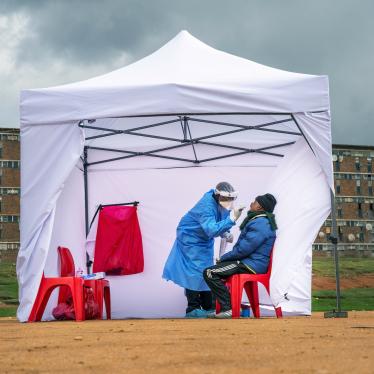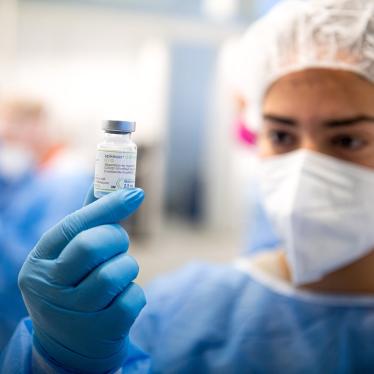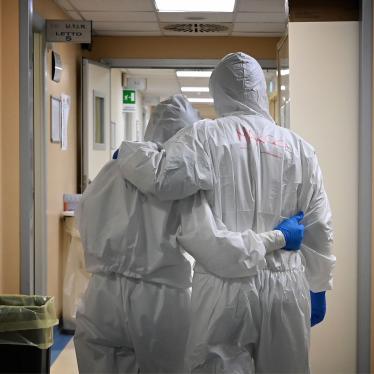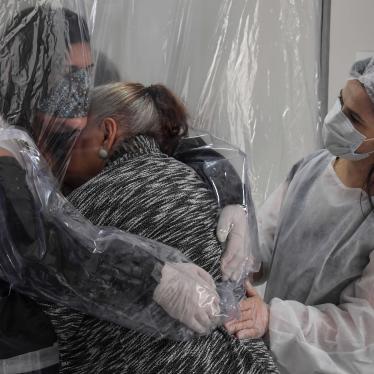Human Rights Watch’s correspondence with Covid-19 vaccine makers can be found here.
A new report by vaccine experts identifying 100+ companies with mRNA manufacturing potential can be found here.
To:
Olaf Scholz
Federal Chancellor of Germany
Cc: Karl Lauterbach, Federal Minister for Health; Annalena Baerbock, Federal Minister of Foreign Affairs; Robert Habeck, Federal Minister of Economy and Climate; and Svenja Schulze, Federal Minister for Economic Cooperation and Development
Re: Urgent Intervention to Ensure BioNTech Shares Technology
Dear Chancellor Scholz,
We write on behalf of Human Rights Watch and the European Center for Constitutional and Human Rights (ECCHR) to urge you to take all available measures to ensure that German mRNA vaccine developers, starting with BioNTech, undertake technology transfers abroad and support the wider manufacture of Covid-19 vaccines to swiftly save lives and protect human rights around the world. The new Covid-19 virus Variant of Concern, Omicron, and emerging surges of the pandemic, make German government action more urgent.
We also urge the German government to immediately drop its opposition to India and South Africa’s proposal at the World Trade Organization to temporarily waive certain intellectual property rules, a measure that would expand access to lifesaving vaccines and other health products.
Germany and other high-income governments are administering booster shots and third doses domestically, though many people at high-risk of severe illness and death in low- and middle-income countries are still waiting for their first dose. Severely unequal access to Covid-19 vaccines and global supply shortages continue to threaten health, lives, and livelihoods as new variants emerge.
The German government provided funding to BioNTech to further research and develop its mRNA Covid-19 vaccine.[1] It has a particular responsibility to press the company to make its vaccine technology and know-how more widely available to capable manufacturers in Africa, Asia, and Latin America, to diversify and expand production, and speed-up distribution.
The coordinator of the AccessIBSA Project and a vaccine expert from the MSF Access Campaign have jointly identified over 100 manufacturers from Africa, Asia, and Latin America with the potential to produce mRNA vaccines.[2] We have enclosed a copy of their report with this letter. In late October, the New York Times identified “10 strong candidates to produce mRNA vaccines in six countries on three continents.”[3]
The German government should urgently take all available measures, including by negotiating for the swift adoption of the TRIPS waiver at the World Trade Organization, to ensure that German mRNA Covid-19 vaccine developers, starting with BioNTech, undertake more widespread technology transfers. It should oversee this process to ensure that as many capable manufacturers as possible receive timely access to intellectual property, vaccine technology, and materials needed to support manufacturing.
Doing so would scale up and diversify vaccine production more quickly. This would supplement BioNTech’s efforts to create end-to-end manufacturing in Senegal and Rwanda.[4] Construction of these facilities is expected to begin only in mid-2022 and ultimately these facilities will be able to produce 50 million doses each year.[5]
In addition, the government should periodically and publicly report on the specific steps it has taken to expand technology transfers. This should include reporting on how global potential manufacturing capacity is being utilized and whether technology is being provided to relevant WHO technology sharing hubs.
These steps are in line with Germany’s human rights obligations under the International Covenant on Economic, Social, and Cultural Rights to engage in international cooperation to ensure the right to health and that all can benefit from advances in scientific research. Expanding and diversifying technology transfers to enable global production of vaccines across all regions is critical not only to help ensure the swiftest possible access to Covid-19 vaccines for everyone, everywhere, but to help develop global manufacturing capacity and achieve the Sustainable Development Goals (especially Goals 3 and 9).[6] We strongly urge your government to use its leverage and all available regulatory and executive powers to expand technology transfers abroad.
The overwhelming majority of BioNTech-Pfizer vaccines have gone to high-income countries, according to data gathered by Airfinity and reported by the People’s Vaccine Alliance.[7] Pledges to redistribute vaccine doses purchased by Germany, while welcome, are not enough. As of October 12, 2021, high-income governments had collectively pledged to donate 1.8 billion vaccine doses, but just 14 percent had been delivered, according to Airfinity data cited by the People’s Vaccine Alliance.[8]
Your administration should act now to ensure the lifesaving innovations developed by German companies can be shared more broadly, especially with low- and middle-income countries. We stand ready to discuss this further with you and facilitate expert briefings with technical experts.
Sincerely,
Wenzel Michalski
Germany Director
Human Rights Watch
Miriam Saage-Maaß
Vice Legal Director and Program Director, Business and Human Rights
European Center for Constitutional and Human Rights
[1] BioNTech, “BioNTech to Receive up to €375M in Funding from German Federal Ministry of Education and Research to Support COVID-19 Vaccine Program BNT162,” September 15, 2020, https://investors.biontech.de/news-releases/news-release-details/biontech-receive-eu375m-funding-german-federal-ministry (accessed October 29, 2021).
[2] Achal Prabhala and Alain Alsahani, “Pharmaceutical manufacturers across Asia, Africa and Latin America with the technical requirements and quality standards to manufacture mRNA vaccines,” AccessIBSA, December 2021. Copy enclosed with the letter. This includes seven potential manufacturers identified by the MSF Access Campaign in their August 2021 publication. See MSF Access Campaign, “Share mRNA Technologies, Save Lives,” August 2021, https://msfaccess.org/sharing-mrna-vaccine-technologies-save-lives (accessed October 20, 2021), Annex 2, p. 6.
[3] Stephanie Nolen, “Here’s Why Developing Countries Can Make mRNA Covid Vaccines,” New York Times, October 22, 2021, https://www.nytimes.com/interactive/2021/10/22/science/developing-country-covid-vaccines.html (accessed November 4, 2021).
[4] Carley Petesch, “BioNTech to work with Senegal, Rwanda to make mRNA vaccines,” AP News, October 26, 2021, https://apnews.com/article/coronavirus-pandemic-business-health-rwanda-coronavirus-vaccine-f800599b45c433f09a03bdd625c46ddb (accessed December 3, 2021).
[5] Ibid.
[6] UNDP Oslo Governance Centre, “Goal 3: Good Health and Well-being,” Sustainable Development Goals, https://www1.undp.org/content/oslo-governance-centre/en/home/sustainable-development-goals/goal-3-good-health-and-well-being.html#targets (accessed December 3, 2021); UNDP Oslo Governance Centre, “Goal 9: Industrial Innovation and Infrastructure,” Sustainable Development Goals, https://www1.undp.org/content/oslo-governance-centre/en/home/sustainable-development-goals/goal-9-industry-innovation-and-infrastructure.html#targets (accessed October 28, 2021).
[7] Rohit Malpani and Alex Maitland, “Dose of Reality: How rich countries and pharmaceutical corporations are breaking their vaccine promises,” The People’s Vaccine Alliance, October 21, 2021, https://app.box.com/s/hk2ezb71vf0sla719jx34v0ehs0l22os (accessed October 28, 2021).
[8] Rohit Malpani and Alex Maitland, “Dose of Reality: How rich countries and pharmaceutical corporations are breaking their vaccine promises,” The People’s Vaccine Alliance, October 21, 2021, https://app.box.com/s/hk2ezb71vf0sla719jx34v0ehs0l22os (accessed October 28, 2021).








